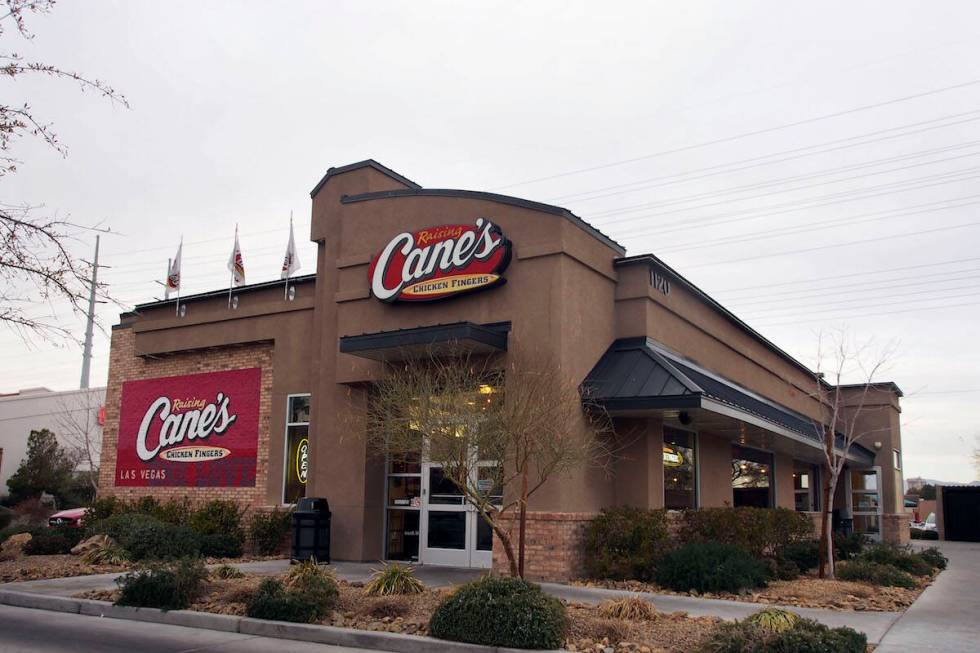A CEO wiping down tables? How one Raising Cane’s executive cleaned up in Las Vegas

A fast-food chain is deploying corporate workers to its restaurants amid the nation’s ongoing labor shortage — including the placement of a chief executive in Las Vegas.
Chicken restaurant Raising Cane’s began assigning about 250 of its corporate staff to some of its approximately 580 stores in more than 30 states and the Middle East, the Baton Rouge, Louisiana-based company said. The company employs about 40,000 people systemwide.
The move, which began last week and will last roughly until positions are filled, is part of the privately held company’s goal to reach 50,000 employees in 50 days, it said. It’s part of a larger plan to add more than 100 restaurants in 10 new markets over the next six months as the global economy recovers from the coronavirus pandemic.
In planning this growth, corporate workers are volunteering to work in restaurants as a set of helping hands, and to run employee recruitment booths.
‘It’s what I can do if help is needed’
AJ Kumaran, co-CEO and COO, said he worked in the Las Vegas Valley for about three days last week. Beginning Oct. 7, he donned the red Cane’s polo at locations in Henderson, North Las Vegas and on Tropicana Avenue, primarily helping teams keep up with sanitation demands.
“It’s the gesture that helps the most,” he said Monday. “Me cooking chicken is not a pretty sight, but it’s what I can do if help is needed.”
Raising Cane’s requires its corporate employees to train as cashiers and fry cooks, as well. Kumaran even noted his title includes the two jobs. A recently hired executive spent 3½ months working in restaurants before joining the corporate team, he said.
The country’s labor shortage isn’t exclusive to restaurants. The U.S. added about 29,000 food service jobs in September out of the 194,000 total jobs added nationally, according to a report from the Department of Labor. The numbers surprised some experts, who expected more gains.
Still, the slow return to pre-pandemic staffing is particularly noticeable in food service. September’s totals follow the minimal growth in the industry also reported in August, according to the national report. Nevada’s job report will be released later this month.
Raising Cane’s outlets nationwide are noticing the labor shortage, Kumaran said. Hiring in Las Vegas, in particular, comes at a time when the company plans to open a flagship, two-story location on the Strip later this year. Elsewhere, about 150 restaurants limited their hours or operations because of limited staff.
“It’s been tough,” he said. “There are many theories out there about why the labor pinch exists. I don’t know why. There are many different reasons coming together. We could use a lot more help right now.”
Many facets to labor shortage
Factors beyond pay, such as benefits and scheduling, appear to be a bigger influence on workers than ever before, UNLV labor economist Jeff Waddoups said.
Raising Cane’s use of corporate workers may benefit the company beyond filling gaps on the shift, he said. Corporate employees are more likely to influence hiring practices. They could learn more about what it’s like to be a frontline worker.
“Maybe they can come up with creative solutions to deal with these, not only the pecuniary problems — that is, low wages — but the non-pecuniary problems: that is, inflexible schedules, a hostile public, things like that that would cause people not to want to work there,” Waddoups said. “If they can experience that themselves, they might be better at setting policy that would attract the workforce they need to grow.”
The labor shortage is one felt across all markets and something Kumaran noticed while staying on the Strip. His hotel wasn’t running room service because of the staff size, he said. He declined to identify the hotel.
The company hopes the volunteer help, along with expanded educational benefits announced earlier this year and planned pay increases, will encourage people to apply.
“In the market generally, I saw a shortage of staff,” he said. “I saw a shortage of Uber rides, of taxi cars. I could feel those shortages generally. But, I also saw that Las Vegas was very busy. It was good to see after the last year and a half.”
McKenna Ross is a corps member with Report for America, a national service program that places journalists into local newsrooms. Contact her at mross@reviewjournal.com. Follow @mckenna_ross_ on Twitter.